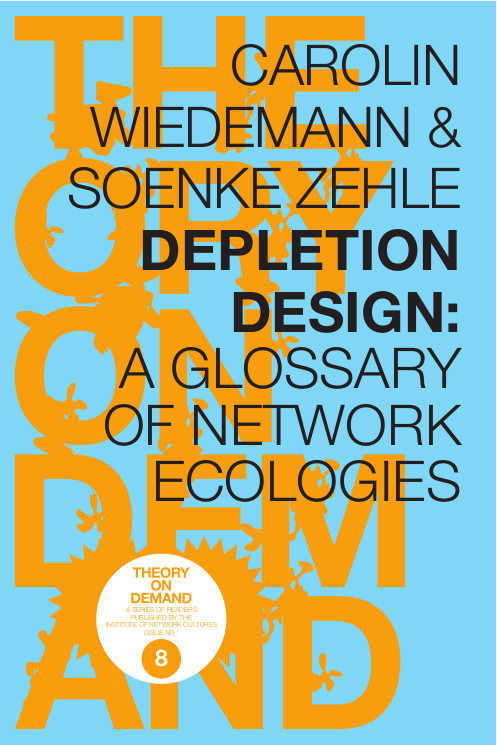Carolin Wiedemann, Soenke Zehle (eds.): Depletion Design: A Glossary of Network Ecologies (2012)
Filed under book | Tags: · algorithm, anonymous, architecture, biopolitics, commons, creative industries, cyborg, design, ecology, hackerspace, media ecology, network ecology, networks, politics, remix, software, spam, technology, theory

“Depletion Design suggests that ideas of exhaustion cut across cultural, environmentalist, and political idioms and offers ways to explore the emergence of new material assemblages. Soenke Zehle and Carolin Wiedemann discuss Depletion Design with Marie-Luise Angerer, Jennifer Gabrys and David M. Berry, inviting tm13 participants into a collaborative reflection on the necessity to understand human beings as one species among others – constituted by interactions of media, organisms, weather patterns, ecosystems, thought patterns, cities, discourses, fashions, populations, brains, markets, dance nights and bacterial exchanges (Angerer); on the material leftovers of electronics as provocations to think through and rework practices of material politics that may be less exploitative within our natural-cultural relationships (Gabrys); and on lines of flight from and through the computational – about expanding them into new ways of living beyond current limitations and towards new means of judgment and politics (Berry).
We, or so we are told, are running out of time, of time to develop alternatives to a new politics of emergency, as constant crisis has exhausted the means of a politics of representation too slow for the state of exception, too ignorant of the distribution of political agency, too focused on the governability of financial architectures. But new forms of individual and collective agency already emerge, as we learn to live, love, work within the horizon of depletion, to ask what it means to sustain ourselves, each other, again. Of these and other knowledges so created, there can no longer be an encyclopedia; a glossary, perhaps.”
Contributors: Marie-Luise Angerer (Cyborg), Franco ‘Bifo’ Berardi (Exhaustion, Soul Work), David M. Berry (On Terminality), Zach Blas (Queer Darkness), Drew S. Burk (Grey Ecology), Gabriella Coleman (Anonymous), Heidi Rae Cooley (Ecologies of Practice), Sebastian Deterding (Playful Technologies, Persuasive Design), Jennifer Gabrys (Natural History, Salvage), Johannes Grenzfurthner & Frank A. Schneider (Hackerspace), Eric Kluitenberg (Sustainable Immobility), Boyan Manchev (Disorganisation, Persistence), Lev Manovich (Software), Sonia Matos (Wicked Problems), Timothy Morton (Ecology without Nature), Jason W. Moore (Crisis), Anna Munster (Digital Embodiment), Eduardo Navas (Remix[ing] Re/Appropriations), Brett Neilson (Fracking), Sebastian Olma (Biopolitics, Creative Industries, Vitalism), Luciana Parisi (Algorithmic Architecture), Jussi Parikka (Dust Matter), Judith Revel (Common), Ned Rossiter (Dirt Research), Sean Smith (Information Bomb), Hito Steyerl (Spam of the Earth)
Publisher Institute of Network Cultures, Amsterdam, Dec 2012
Theory on Demand series, 8
Creative Commons Attribution-NonCommercial-ShareAlike 3.0 Netherlands License
ISBN 9789081857512
via jussiparikka.net
PDF, PDF (updated on 2015-7-9)
Comment (0)Andrew Barry: Political Machines: Governing a Technological Society (2001)
Filed under book | Tags: · citizenship, european union, governance, intellectual property, interactivity, neoliberalism, networks, politics, society, sociology of science, technology

Technology assumes a remarkable importance in contemporary political life. Today, politicians and intellectuals extol the virtues of networking, interactivity and feedback, and stress the importance of new media and biotechnologies for economic development and political innovation. Measures of intellectual productivity and property play an increasingly critical part in assessments of the competitiveness of firms, universities and nation-states. At the same time, contemporary radical politics has come to raise questions about the political preoccupation with technical progress, while also developing a certain degree of technical sophistication itself.
In a series of in-depth analyses of topics ranging from environmental protest to intellectual property law, and from interactive science centres to the European Union, this book interrogates the politics of the technological society. Critical of the form and intensity of the contemporary preoccupation with new technology, Political Machines opens up a space for thinking the relation between technical innovation and political inventiveness.
Publisher Continuum International Publishing Group, 2001
ISBN 0485006340, 9780485006346
320 pages
PDF (no OCR)
Comment (1)Daniel Kreiss: Taking Our Country Back? Political Consultants and the Crafting of Networked Politics from Howard Dean to Barack Obama (2010)
Filed under thesis | Tags: · internet, networked politics, networks, politics, social movements, united states
While many scholars argue that the falling cost of producing and disseminating digital information drives new forms of collective political action, this dissertation reveals how digital tools, practices, and cultural processes together shape electoral campaigning. In the process, this research shows that digital technologies are not the primary drivers of changes in political practice and networked politics is not as radically democratic as many scholars suggest. Through open-ended interviews, archival research, and participant observation this work shows how until the 2003-2004 presidential election political consultants used the Internet as mass medium. During the Howard Dean campaign, however, consultants deployed a set of Internet applications that enabled citizens to work together on tasks such as voter mobilization and fundraising. As these new media staffers drew from their corporate experience to build these tools they described the campaign as a technologically-empowered, 1960s-style social movement. The dissertation concludes by showing how after the campaign these staffers founded political consultancies and brought these tools, techniques, and claims to many other sites in electoral politics, including Barack Obama’s bid for the presidency. While telling this history, this dissertation shows how social formations and cultural work together shape the uptake of tools in electoral campaigning. Meanwhile, in contrast to many accounts of democratizing ‘Web 2.0’ technologies, this dissertation reveals that digital media vastly extend the power of campaign consultants to motivate, channel, and control electoral work.
Dissertation
Department of Communication, Stanford University, 2010
251 pages
The thesis was later published as a book, author, publisher
Comment (0)
